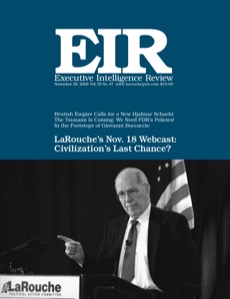LaRouche Webcast: Greatest Crisis in Modern History: The Last Chance for Civilization?
by Lyndon H. LaRouche, Jr.
Lyndon LaRouche stated that the post-Bretton Woods financial-monetary system is in a terminal breakdown crisis, and that any effort to rescue it will destroy the planet. “You have to choose: Replace the system, or get a new planet.” He said the world is now operating under an imperialist system, based in London, but which operates globally. The way out of this crisis, LaRouche added, is to replace the British-inspired money system with a credit system; go back to the U.S. Constitution, and create a “credit-based dollar” on which to build a new system, after putting the present system through bankruptcy reorganization. The full transcript of the Nov. 18 webcast, including questions and answers.
Economics
Brutish Empire Calls for a New Hjalmar Schacht
by John Hoefle
The clear intent of the British is to use this financial crisis to return the world to the way it existed before the American Revolution. The alternative, as Lyndon LaRouche has indicated, is a return to the credit system established by the U.S. Constitution.
Business Briefs
International
The Tsunami Is Coming: We Need FDR’s Policies!
by Helga Zepp-LaRouche
In a leaflet for circulation in Germany, Helga Zepp-LaRouche writes that the present crisis is just the beginning of the financial collapse: The worst is still to come. She indicates that the catastrophe could be avoided, but only if the huge volume of outstanding derivatives contracts are frozen, and a new financial architecture, in the tradition of Franklin Roosevelt, is implemented.
Mexican Nationalist Leader Backs PHLINO: Northwest Hydraulic Plan
by Alberto Vizcarra Osuna
‘One Mexico for All’: Pro-PLHINO Committee Welcomes Cárdenas
International News
National
A Four-Power Bloc Can Break the Opposition to Reform
by Lyndon H. LaRouche, Jr.
Lyndon LaRouche’s opening remarks to a private meeting on Nov. 19. The only way out of an otherwise almost hopeless situation, he said, is for sovereign governments to put the entire financial system into bankruptcy reorganization, and replace it with a fixed-exchange-rate credit system. This will require the combination of four sovereign governments: the United States, Russia, China, and India.
National News
History
In the Footsteps of Giovanni Boccaccio
by Michele Steinberg
In a January 2006 webcast, LaRouche showed how to uplift the population, at a time when all leaders have failed, and the people themselves must take the responsibility: the understanding of history with great irony, through the eyes, or in the footsteps, of a great figure such as Italy’s Giovanni Boccaccio. The collapse of the Lombard banking houses and the resultant New Dark Age began at the middle of his life.
The 14th-Century Dark Age: Boccaccio’s Classic Tale of the Plague
A translation of an excerpt from Boccaccio’s Decameron.
Editorial
When They Say Snow Is Black...



